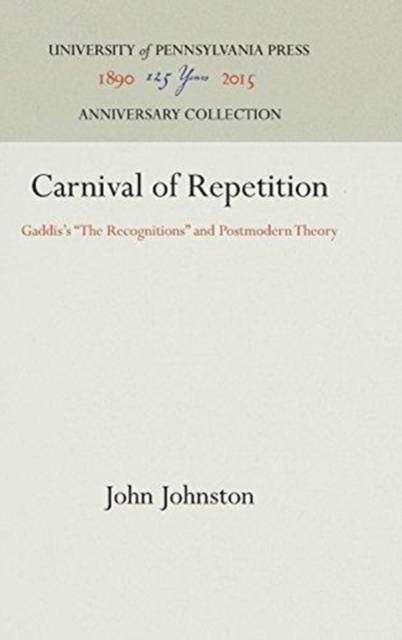
Vous voulez être sûr que vos cadeaux seront sous le sapin de Noël à temps? Nos magasins vous accueillent à bras ouverts. La plupart de nos magasins sont ouverts également les dimanches, vous pouvez vérifier les heures d'ouvertures sur notre site.
- Retrait gratuit dans votre magasin Club
- 7.000.000 titres dans notre catalogue
- Payer en toute sécurité
- Toujours un magasin près de chez vous
Vous voulez être sûr que vos cadeaux seront sous le sapin de Noël à temps? Nos magasins vous accueillent à bras ouverts. La plupart de nos magasins sont ouverts également les dimanches, vous pouvez vérifier les heures d'ouvertures sur notre site.
- Retrait gratuit dans votre magasin Club
- 7.000.0000 titres dans notre catalogue
- Payer en toute sécurité
- Toujours un magasin près de chez vous
136,95 €
+ 273 points
Description
Although published many decades ago, William Gaddis's The Recognitions is only now beginning to receive the critical attention it deserves. Carnival of Repetition, the first full-length study of the novel, is a sophisticated analysis that places it in a new literary and cultural context .
This novel of the 1950 s is unlike anything else from that decade. It harks back to the works of high modernism (exemplified by Joyce's Ulysses) and looks forward to postmodern fiction (especially as practiced by Barth, Pynchon, and DeLillo). Imitation is its major theme, one that Gaddis pursues on many levels, across several continents, into mazes of arcane knowledge and bogus scholarship, and even into the novel's structure through the repetition of prior texts and the interplay between literal and disguised quotation. Through an endless play of repetition, Gaddis confounds the reader's recognition of similarity and difference. Johnston uses the theories of Bakhtin and Deleuze (and others, such as Julia Kristeva) to map out a context for this most unusual and difficult work. From Bakhtin, he appropriates the concepts of "carnivalesque" fiction and dialogism (or a plurality of independent voices, no one more important than another). From Deleuze, he borrows the idea of the simulacrum, a copy that presupposes no original and that becomes meaningful through a process of infinite repetition. With these instruments, Johnston analyzes the labyrinth of copy and counterfeit that Gaddis constructs in his novel.Spécifications
Parties prenantes
- Auteur(s) :
- Editeur:
Contenu
- Nombre de pages :
- 184
- Langue:
- Anglais
- Collection :
Caractéristiques
- EAN:
- 9780812281798
- Date de parution :
- 01-03-90
- Format:
- Livre relié
- Format numérique:
- Genaaid
- Dimensions :
- 156 mm x 234 mm
- Poids :
- 526 g







